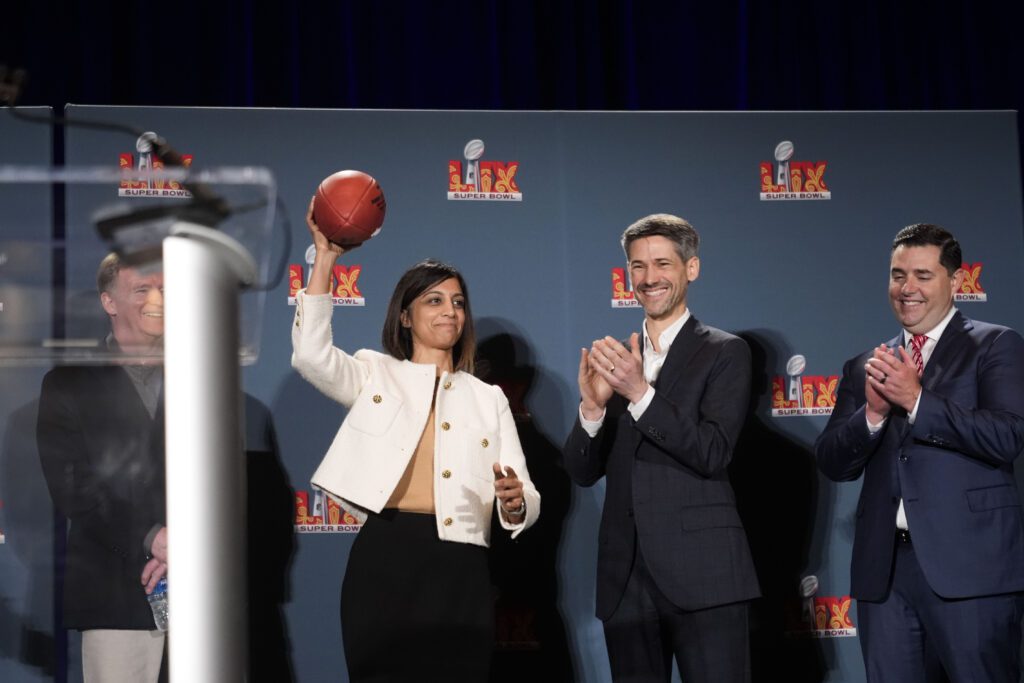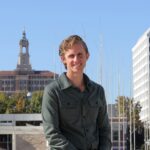As the Capital of Silicon Valley, San Jose fuels global innovation — but despite the city’s considerable economic heft, its elected leaders still struggle to command political clout on a broader stage.
The city, California’s third largest, has never produced a competitive candidate for governor in its modern history. And over the past 50 years, only two San Jose mayors — Sam Liccardo and Norm Mineta — have managed to parlay their local political success into winning runs at federal office.
Why is that?
It’s a question that has grown more salient amid widespread speculation that Mayor Matt Mahan’s recent political maneuvers — including his frequent media appearances and rhetorical pot shots at Gov. Gavin Newsom — mark an effort to lay the groundwork for his own eventual run for higher office.
Mahan insists he has no immediate plans for such a run — including next year’s California gubernatorial election — and that he remains focused on his work leading San Jose. Still, he hasn’t closed the door to a future election bid.
Despite the political headwinds that have historically plagued San Jose mayors, top political experts say Mahan may be better positioned to break through the office’s apparent career ceiling than nearly any of his predecessors.
Mahan’s office declined an interview.
The Bay Area’s media bubble
While the national news media consistently keeps its cameras trained on San Francisco and Los Angeles, San Jose politicians have often struggled to gain a foothold in the broader political conversation.
For San Francisco, a city that is regularly excoriated by right-wing commentators for its downtown travails, this has been both a blessing and a curse. But for local politicos hungry for publicity, all that coverage comes in handy.
“If you’re a politician there, you get an inordinate amount of attention,” Phil Matier, a longtime Bay Area news commentator, told San José Spotlight. “National media would come into San Francisco just for a good week to have fun, and they would cover the politics there. They elevated everybody — from Willie Brown to Gavin Newsom — to different heights.”
Despite the fact that San Jose has a significantly larger population than San Francisco, it receives dramatically less coverage. Only a handful of print and broadcast news outlets still maintain offices in the city, and local news stories rarely break through into national coverage. For San Jose leaders, this means, with a few notable exceptions, they seldom get the booking for national news shows to comment on Bay Area politics.
Something else that sets the Bay Area’s two largest cities apart is the sheer volume of politics that takes place in San Francisco.
“There are 100 democratic clubs in San Francisco,” Sacramento-based Democratic strategist Steven Maviglio told San José Spotlight. “You name it — every neighborhood, every ethnicity, every philosophy — has their own club and knows where you go to get your endorsements.”
All that local organizing can prove to be a major asset for those looking to springboard their political career to the next level, Maviglio said.
In contrast, Maviglio said, “I don’t think San Jose has that infrastructure yet.”

Building a political brand
One way for a mayor to gain wider notoriety is to take a strong stand on a hot-button issue of national significance.
For example, in 2004, then San Francisco Mayor Gavin Newsom burst onto the national stage when he authorized the marriages of thousands of same-sex couples, more than a decade before the U.S. Supreme Court legalized such unions.
But San Jose leaders haven’t been well positioned to carry out similar feats of political showmanship, Garrick Percival, associate professor of political science at San Jose State University, said. That’s because for the past 30 years, the city has produced a string of mayors who have landed in roughly the center of the political spectrum for California Democrats, he said.
And moderate politics don’t always grab headlines.
“Successful leaders have been able to lead or at least contribute to national conversations that are important to each party,” Percival told San José Spotlight. “More centrist candidates, like San Jose’s, have a more difficult time doing that.”
The struggle for political relevance beyond City Hall is exacerbated by San Jose’s weak mayor system of governance, which vests executive authority in a city manager rather than the mayor. At city council, San Jose’s mayors cast just one of the body’s 11 votes, limiting their ability to set the city’s policy agenda and make a name for themselves on high-profile reforms.
Despite those hurdles, some recent mayoral policy efforts have broken through.
Liccardo, who won his bid for congress in 2024, made a number of appearances on national cable news programs and penned op-eds to tout a landmark gun control policy requiring firearm owners to register for liability insurance and pay a fee to help support gun violence prevention efforts. The policy, approved in 2022, faced years of delays due to legal challenges and administrative hurdles.
Similarly, Mahan found himself in the national spotlight earlier this year over his controversial plan to arrest homeless people who refuse shelter. At the time, he made the interview rounds on networks like CNN and MSNBC.
Meanwhile, the controversies that embroiled other San Jose mayoral administrations have occasionally spilled out beyond the local news market as well.
Former San Jose mayor Chuck Reed, who left office in 2014, spent much of his tenure battling public sector unions over his effort to reign in spiraling pension expenditures. In 2006, the city’s then-mayor Ron Gonzales faced a number of felony charges — including fraud, bribery and embezzlement — related to a secretly negotiated garbage contract. The charges were eventually dropped.
In such a hard scrabble political environment, San Jose mayors’ popularity tends to peak about four years into their tenure before declining rapidly, state Sen. Dave Cortese said.
“You get into that lame duck world after that where it’s a lot easier for people to start taking pot shots at you and criticizing you,” Cortese, who lost his own bid for San Jose mayor in 2014, told San José Spotlight. “Being in a big city where there’s lots of problems, lots of challenges, and oftentimes, a relatively toxic second term in office … it’s challenging to make the move (to higher office).”
A window of opportunity?
But now some local political watchers say that Mahan — who will be up to run for another four-year term as mayor in 2028 — has a rare opportunity to break the career curse that’s haunted other mayors.
Following the nationwide losses Democrats suffered in the 2024 elections, the party has engaged in a hefty amount of soul-searching, as it seeks to find the winning political platform that will ease its course back into national electoral success.
“Mahan, I think, is trying to contribute to those conversations,” Percival said.
Mahan recently launched a coalition that aims to draw political support for what he calls a statewide “Back to Basics Agenda” focused on housing affordability, homelessness and public safety.
 Mahan has also made waves by taking public stands that put him at odds with other California Democrats, including his vocal support for last year’s tough-on-crime Proposition 36 ballot measure. Such political friction could ultimately work in Mahan’s favor, Terry Christensen, San Jose State University political science professor emeritus, said.
Mahan has also made waves by taking public stands that put him at odds with other California Democrats, including his vocal support for last year’s tough-on-crime Proposition 36 ballot measure. Such political friction could ultimately work in Mahan’s favor, Terry Christensen, San Jose State University political science professor emeritus, said.
“He’s actually building a statewide base,” Christensen told San José Spotlight. “I think of all of the mayors we’ve had, just looking at where he is right now, he’s got the most potential for a run for statewide office.”
Contact Keith Menconi at [email protected] or @KeithMenconi on X.



Leave a Reply
You must be logged in to post a comment.